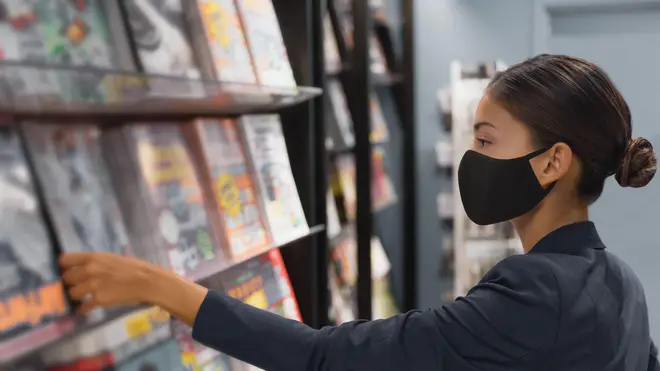
James O'Brien 10am - 1pm
10 December 2021, 06:22 | Updated: 7 June 2023, 08:56

Mandatory face masks have been introduced in more indoor settings, amid fears over the Omicron Covid variant.
The legal requirement in England has been extended to spaces including cinemas, theatres and churches.
Sports stadia are also included in the updated regulations - which were published on Thursday evening - but the Department of Health confirmed face coverings will only be mandatory in indoor areas.
It comes as part of 'Plan B' confirmed by Government on Wednesday due to concerns over Omicron.
There were a total of 817 confirmed cases of the variant in the UK as of Thursday, the UK Health Security Agency said.
Read more: Boris backlash: Three parties probed as pressure grows on PM over Xmas scandal
Read more: 'Unfit to lead': Sir Keir Starmer urges Tories to oust Boris Johnson amid Xmas party row

Health Secretary outlines Winter coronavirus plan B
The reviewed 'Plan B' measures will also see people return to working from home where possible from Monday and the introduction of Covid passports for large venues from Wednesday.
They will be put to debate and voted on in the Commons next week - and with Labour's support are certain to be approved, despite the prospect of a large Conservative revolt.
However, loopholes have already been discovered in the plans, with shoppers being exempt from wearing face masks in shops if they walk around singing.
The regulations state that such occasions "include singing as part of a choir, or during a service or rehearsal, or for performance".
Downing Street has said it would be "hard to justify" people having a "reasonable excuse" to remove their masks to sing while getting groceries under the rules.
Professor John Edmunds, a member of the Scientific Advisory Group for Emergencies (SAGE), told a Royal Society of Medicine briefing: "I think [restrictions are] a necessary evil ... it's very damaging for parts of the economy, the hospitality sector, retail sector in particular - they're going to be affected.
"Unfortunately, we have to do it. The rate at which this virus is spreading is doubling every two or three days."
He added: "Even though there's very few cases here now, and it seems like an overreaction, it absolutely is not an overreaction."
'Plan B' measures will be reviewed on January 5, before their expiry date of January 26.